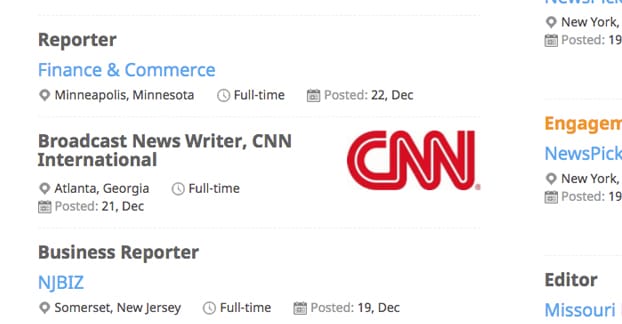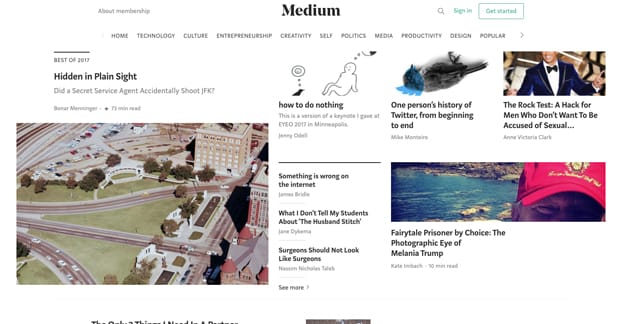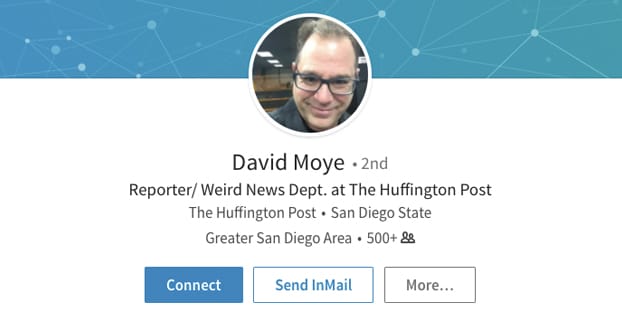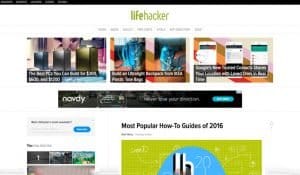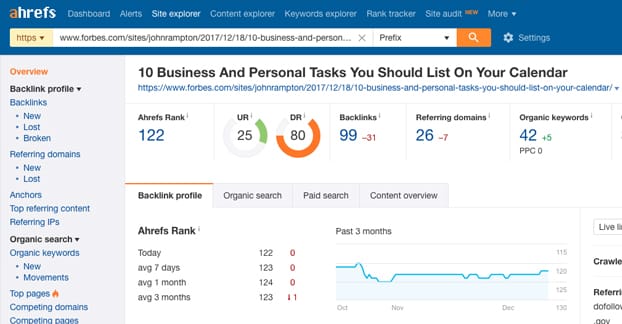The Great Recession may be more or less over, but that doesn’t mean it’s any easier to get a job these days. The cost of living is always increasing. Pay rates – and consequently savings for older people – are not going up. Pensions are down, retirement plans are down, and people are staying in their careers decades after they should have retired. More and more people are reaching an age where the need to enter the workforce, but fewer and fewer people are leaving it to make room for them.
The ideal solution to this whole situation would be some kind of universal minimum income and support necessary to live and be free to pursue your ideal career, but we don’t have that kind of world. Instead, we simply have to compete in the rat race, especially when it comes to finding that dream job.
I’m not going to judge you for wanting to pursue your dreams. Ambition is important, and breaking into a field of your choice will help you carry that relevance and job history throughout the rest of your life. The trick is to actually break into the industry and get that job.
As you can probably tell, I’m primarily focusing this advice on people who are fresh out of college or even high school, people who are willing to put in the legwork to get a foot in the door. If you’re older and looking for a career change, much of the advice can still apply, but you might not have the luxury to pursue some of it.
Unfortunately, for the most part, a lot of advice is simply going to boil down to one of two things. Either you A) meet the right people and befriend them, or you B) do a lot of the work on your own, unpaid, until someone notices you and you can break into a paying gig. That’s just the way the world works.
1. Start Traditional with an Internship
Internships are the greatest trick the capitalist devil ever played. Corporations able to get free labor with very little oversight, with the mere promise of the chance at a job at the end of it, paid in experience? Anyone beyond the range of “fresh college grad” likely has no leeway in their life to spend months working for free. Yet, the unfortunate fact of the world is that internships are one of the best ways to get a foot in the door.
An internship gets you doing the job you want to do, or at least a job adjacent to that job. It gets you introduced to people who, while they may not hire you directly, can put a good word in for you when you apply to other locations. It’s a way to build up connections and references that can help you on down the line.
Of course, you need to be able to do an internship, and you need to perform well enough in your job that you make a favorable impression. Only then do you have a chance of getting hired, or at least getting the thumbs up from people in your company. If that’s not a situation you can afford, you’re going to find this option pretty tough.
2. Write and Submit Op-Ed Pieces
One of the great things about writing is that, while anyone can do it, it takes a special kind of person to do it well. Even when you don’t have a job for your magazine, you can still put your skills to use writing pieces. Do your own citizen journalism. Write about issues both local and national. Write opinion/editorial pieces and submit them far and wide.
Start by submitting your op-eds to sites like the New York Times, the Washington Post, the Huffington Post, and anywhere else that’s high-target. If none of them pick up on it, and it’s not something that’s especially time-sensitive, submit it to a more local round of papers. Local city-wide or county-wide newspapers, even state papers can have a good publication system and can get you some author credits.
If even that doesn’t work, you should have a fallback. Ideally, this will be a site of your own, though there’s more to it than just being a dumping ground for failed op-eds.
3. Network with Journalists and Managers at Conferences
One of the biggest benefits of being a writer is the ability to do your job from literally anywhere. As long as you have a laptop or a tablet and an internet connection, you can write from pretty much any location.
This means you’re free to travel as much as your budget will allow. This means you can visit various news and journalism events, conferences, and gatherings. Any time you can swing an invite or a ticket for an event, do so. Attend these events. Network. Schmooze. Rub elbows, go out to lunch, and generally befriend as many people in as many places as you can. Sooner or later, someone you meet will be able to help you, either because they’re hiring, they’re looking to take on a partner or apprentice, or they know of some opening you can hit up.
4. Keep an Eye on Job Listing Boards
Digital magazines don’t always publish their openings on general job listing boards, but some will. I’ve seen good, high-level opportunities opening up on Craigslist. Check sites like Monster and Indeed, though be ready to field calls from recruiters who care more about their quotas than about their clients. As a tip for Craigslist, keep an eye on the job boards in major cities, not just your local city. Even digital magazines limit their locations to avoid the Craigslist spam filters.
Meanwhile, make a list of the top magazines you’d like to work for and keep an eye on their job pages. You don’t necessarily have to check every day, but you may want to get in the habit of checking weekly, or at least setting up notifications or their RSS if they have one set up.
5. Write Great Guest Posts for Target Magazines
What better way to work for a magazine than to work with them before they realize you’re working with them? Guest posting is often done through entirely different channels than the hiring process.
Start by submitting guest posts that you think are fairly likely to be worth publishing. There’s plenty of advice on this site if you need help getting started. Don’t worry too much about all the link building and SEO aspects; you’re looking for your name as a publication credit on their site more than anything.
Once you have a post or three published, you can submit your application through their job board, or even just send an email to their editor letting them know you’re interested in a position. You realize, of course, that positions aren’t always available, but you’d appreciate the heads up if they know of one. If you’ve built up a strong relationship with the editor and proven your abilities with good content, it should be a piece of cake to get in.
6. Start with Smaller Publications and Work Upwards
No one goes from a nobody to working as a big-name writer at a multi-billion-dollar magazine. You need to start small, in one of two ways. You either start small doing the grunt work for that big company and work your way up the food chain, or you start with a smaller magazine and work your way laterally up the ladder until you’re working for larger sites.
7. Maintain Your Own Journalism Blog
It’s incredibly easy to start your own blog. It’s a lot more difficult to get one that’s up and running in a way that shows up in search results, attracts people, and grows. Your goal is to start your own blog imitating the magazine you want to work for. Write the kinds of content they want to see.
Promotion is the key here. You’re not looking to become one of the big names, you don’t need to worry about micro-optimizations for your keywords and all that jazz. Instead, all you need to do is get prominent enough that you’re shared around on Twitter, linked to from some other magazines, and generally known to exist. Don’t forget to make a resume page and have contact information available in case your favorite magazine comes calling.
8. Take Advantage of Medium.com
If you don’t want to maintain your own blog, Medium.com is a great place for journalism and magazine-quality content.
Anyone can make their own Medium blog for free, and you benefit from the optimizations and visibility of the Medium brand up front. If your content trends well enough you can even get circulation on their front page, which can get you picked up by other people looking to hire a freelancer or journalist themselves. It can be a pretty great opportunity.
9. Get Involved with Local Media
As I mentioned above, everything tends to come down to either knowing the right people or putting in the hours doing the work without recognition. Working with local media outlets and magazines is kind of the best and worst of both. Local media experience can be a great starting point for learning the industry. It can get you paid, and it can get you opportunities to move up in the organization.
On the other hand, local media is often a sort of dead-end home for the people with less ambition or talent. It’s very easy to get stuck in one place for too long, comfortable but immobile. You have to treat a local media job as a temporary gig and bail after a few years, when you think you can find a better opportunity.
10. Create a Small Independent Magazine
The glory days of indie zines passed a few decades ago, but with the internet and apps like Issuu and Scribd, you can make your own digital magazine with relative ease. I say relative because, as you’ll find out if you attempt this, it’s actually a lot of work to run something like a magazine. All of the work of layouts, graphic design, content creation; you have to either do it yourself or you have to pay people to do it.
On the other hand, even a mildly successful magazine can either be bought up by a larger magazine or be poached for talent. You can monetize it and you can sell it when you want to jump ship to a better opportunity.
11. Apply to Jobs you Might Not Get
Always be willing to put yourself out there. Even if you’re wildly underqualified for a job, give it a shot. After all, the worst thing they can do is say no, right?
It’s not like you’ll be blacklisted. If you don’t get it, at the very least you may have a contact in the organization. You still might pull it off, too, if you demonstrate your ability to learn and your willingness to be trained.
12. Be Willing to Relocate
I mentioned that a writer has the ability to create content from anywhere, and while that’s true, it tends to lead to many people thinking they can get ahead just from their living room. The fact is, even if a company is willing to consider hiring someone in a remote position, there are many more opportunities in local branches. A worker looking for remote opportunities might have 100 options; someone willing to relocate to a job can have thousands. Many companies simply trust the ability for employees to come into work more than they trust remote workers. This is slowly changing over time, but we won’t reach equilibrium for a long time.
13. Get More Publication Credits on your Resume
Above all, one of the top three things you can do to ensure that you get a job with a digital magazine sooner or later is to keep publishing your own content. Write for your own site, write for Medium, write for other sites, write for journals, write op-eds; constantly get your name out. Make sure that when someone Googles your name, they’ll see you pop up on a bunch of different sites, not just a Facebook profile and an old web forum you used to use.
14. Keep an Up to Date LinkedIn Profile
LinkedIn is mocked for how little use it is in some industries, but something like digital magazines and general internet publishing is not one of them.
A lot of people at the higher professional levels rely on LinkedIn to investigate potential hires. Make sure you keep your LinkedIn profile up to date with your recent publications and information. If possible, keep at least a minor level of activity on the LinkedIn blog platform. You don’t need to pay for an upgraded account, but if you think it might help, go for it.
15. Build Up References
This is the third of the top three tips. Number 13 is to do more work, as much work as possible, to showcase your skills. Number 14 is to keep yourself available and contactable at all times. And this one, finally, is most important: always be willing to meet with people, talk to people, make connections, and make friends. References and networking are how the world turns today, so if you can’t play the game, you’ll always be at a disadvantage.
 ContentPowered.com
ContentPowered.com



